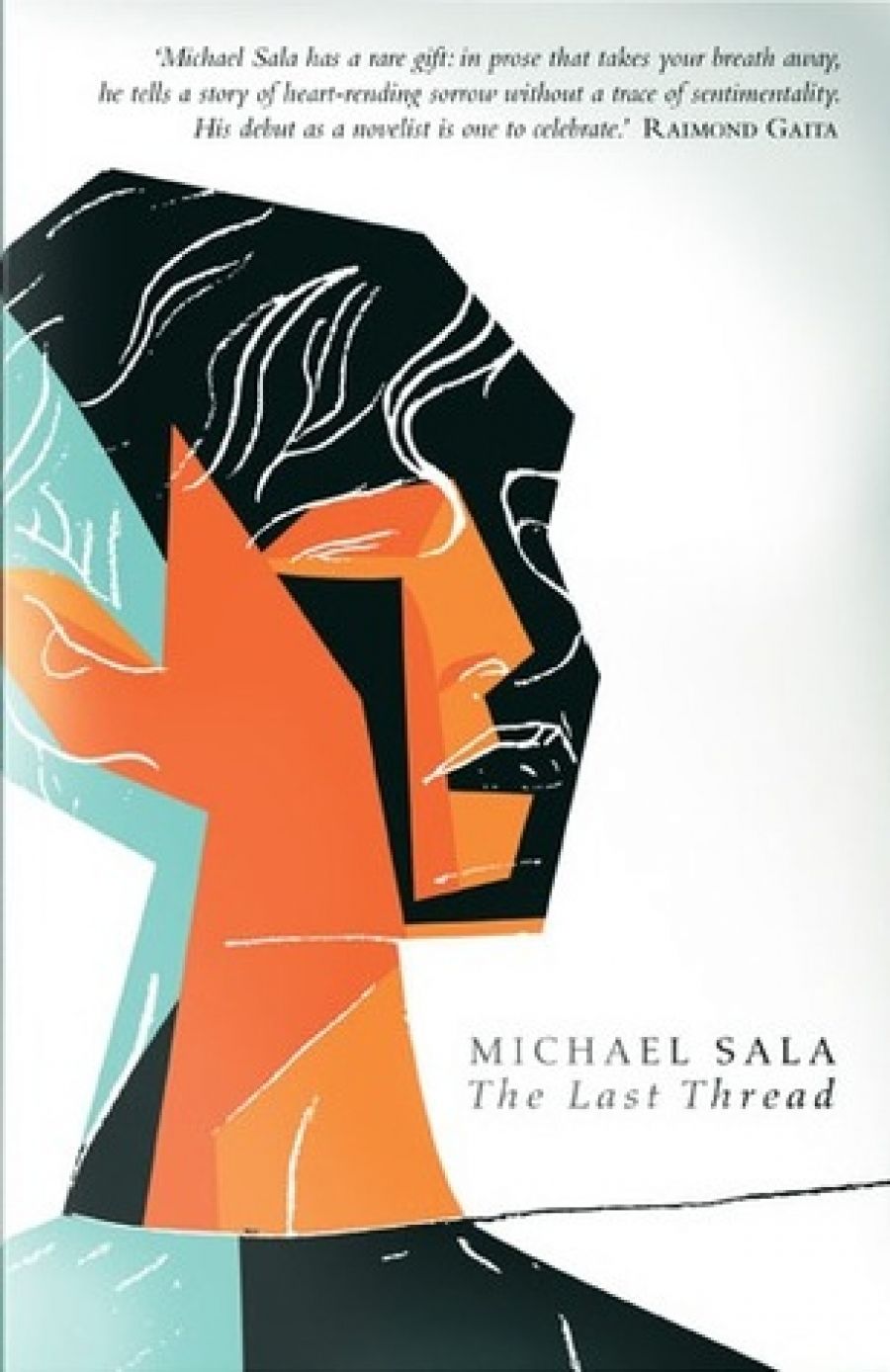
- Free Article: No
- Contents Category: Fiction
- Review Article: Yes
- Online Only: No
- Custom Highlight Text:
Memoir, it seems, is proliferating ever more furiously in Australia, filling bookshelves and review pages like bacteria in still water. We are insatiable in our appetite to read and write memoir, to feel the ‘real’. As a memoirist myself, I am all too aware of my hypocrisy in feeling uneasy about this rage for introspection. But memoir is most successful when it portrays an extraordinary individual; or gives witness to an important experience (accounts of Holocaust survivors, say); or when the personal resonates with the universal, and one person’s experience becomes a prism for that of many. A memoir that hesitates to claim such reader-oriented ratifications risks being a tedious assembly of anecdotes, a public catharsis, or mere narcissism.
- Book 1 Title: The Last Thread
- Book 1 Biblio: Affirm Press, $27.95 pb, 256 pp, 9780987132680
Michael Sala’s début full-length ‘novel’ comes after his shortlisting for The Australian/Vogel’s Literary Award and his inclusion in The Best Australian Stories (2009 and 2010). His publisher, Affirm Press, informs us in the blurb for The Last Thread that it is ‘widely anticipated’, and evokes the autobiographical novels of Michael Ondaatje and J.M. Coetzee. Indeed, it is the story of a young man, his formation in childhood, and the reverberation of that experience in the making of the man. Written in disciplined, almost anaesthetised prose, Sala’s story presents a subtle, cumulative portrait of quiet damage and isolation: one with which some readers may identify.
Damage and disconnection are the main themes. Young Michaelis, born in London of mixed Dutch and Cypriot parentage and brought up in Holland, moves with his family to Australia, back to Holland, thence to Australia, all the while journeying through a childhood marked by abuse from his menacing stepfather Harry, savage competition with his older brother Con, and understandable feelings of inadequacy. The first half of the book describes this childhood in a series of short vignettes (some only a few lines long): his inconclusive relationship with his natural father, the charming, elusive Phytos; various humiliations at the hands of the confident and sporty Con; frequent changes of abode in Australia under the impulse of his restless mother; and the malign tyranny of black-bearded Harry, an ogre of masculine power who silences the helpless Michaelis and forms the main definition against which the adult Michael will later react: brutality, tyranny, selfishness, and injustice. Watching Harry inflict a beating on Con, Sala reflects, ‘I wish that I could take satisfaction in what happens next. But I am waiting for my turn with Harry. I am always second in line. With each lift of that boot, I glimpse my future.’ Harry’s exasperated and increasingly explosive refrain ‘God verdomme!’ barks throughout the book. In the blank lines between each vignette, as much as in the decorously numb prose, we catch his small stepson’s response, which is one of mute shock and fear.
It is in many ways an unexceptional, if unhappy, childhood, not especially dramatic, except in its domestic violence; not uncommon in its shiftlessness and discontent. Sala evokes the emotional ignition of each scene. There is a sense of a great white sky damping every page, the scene static as a tableau, the voices muffled by distance. Distance is crucial in writing memoir, but the risk is that clinical impassivity leaches colour from memory. So subtle and detached, so miniscule in detail, so flatly (though elegantly) told and commonplace are the vignettes of this book, that I found myself wondering: So what? Why should I care?
The second half of the book provides an answer. From the child the man is made. The adult Sala, now Michael, has his own child. In his struggles with impatience, anxiety, and love for his daughter, he counts the lessons and damage of his own childhood. As he notes, ‘When you have such a past, there is an awareness of the possibilities, a question that stays with you, that aches whenever you stray near.’
Is there a deceptive Phytos inside him, a bullying Harry? Where has the boy’s silent rage gone? This is no self-hagiography; Sala admits to anguish over his failings, though, commendably, he does not indulge in martyrish auto-flagellation. Again, the tone is measured, oddly anhedonic; the silencing and the rage are both here, uneasily balanced.
The book is marketed as a life told ‘through fiction’. The first half is devoted to the third-person character of Michaelis; the second half opens in the second person, addressed to his half-brother Thomas, then finally turns to classic first-person narration. These shifts in register bring Sala closer to his own location, but it is not clear in what other ways this work is quasi-fictional (there is no author’s note). Tricks with narratological perspective do not make fiction. Nor does the book’s assembly of vignettes refute the haphazardry of real life. Sala is playing with concepts of distance: Michaelis’s emotional distancing from his own reality, the disconnection with his impaired half-brother and other family members, the long arc of time between experience and memory, the twanging string of paradox between feeling and expression. As the author of a third-person memoir, I understand the forensic and dramatic advantages of such a gambit. But the penalty is that the brave intimacy of memoir – even a delicate, thoughtful memoir such as this – may be lost.


Comments powered by CComment